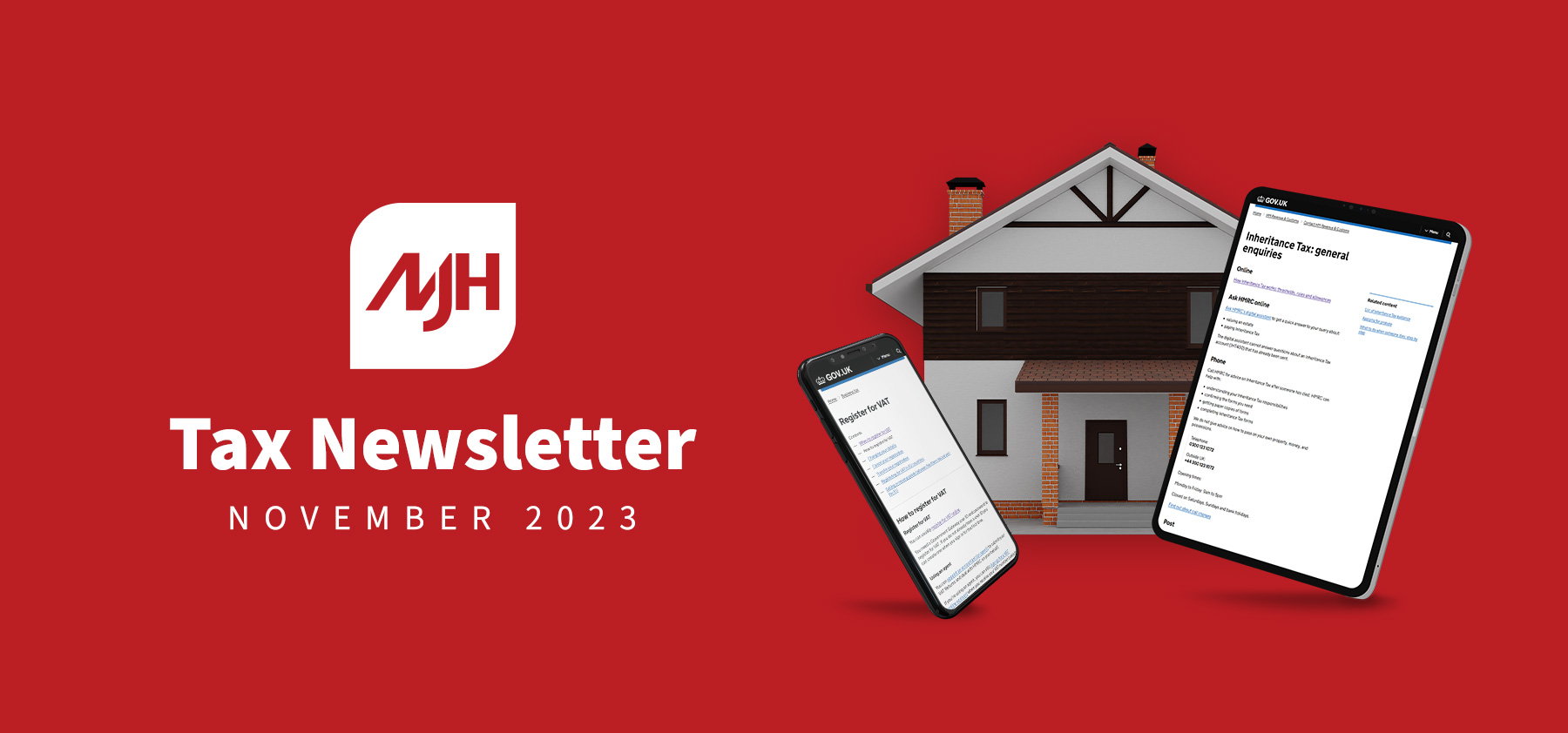
Inheritance Tax Query? Contact HMRC Now

HMRC used to offer an Inheritance Tax and Probate Helpline. From 02 October 2023, the dedicated helpline is closed. This is all part of HMRC and HM Courts and Tribunals Service (HMCTS) working together with the intention of improving the service for probate and Inheritance Tax customers.
There are now two numbers to contact:
– For probate queries, contact HMCTS – telephone 0300 303 0648 (or E-Mail contactprobate@justice.gov.uk)
– For Inheritance Tax queries, contact HMRC – telephone 0300 123 1072 (or use HMRC’s online ‘assistant’ but NOT if an Inheritance Tax account (IHT400) that has already been sent)
HMRC advise that having two probate lines (one by HMRC and one by HMCTS) could confuse callers and the number of transfers between the two departments was significant. However, if the wrong line is called, there is the assurance that they will do their best to assist.
Best use the above contact details and note that probate and Inheritance Tax are now separate.
VAT Registration – Online Only from November 2023

There are two ways to register for VAT:
– The VAT Registration Service (VRS) – online, or
– The VAT1 form – paper by post
This is set to change in November 2023 when only the online VRS route will be available. HMRC said in their September Agent Update that already 95% of registrations are done online. Closing the paper registration route will increase this percentage and increase the use of its digital services.
The digital exemption route will still apply and there are some businesses that will still be required to use the VAT1 form and provide additional information.
Accurate VAT registration is reliant on having all the accurate information to hand. The Agent Update also says ‘input them correctly’! Please help yourself, HMRC and your accountant by having this accurate information.
HMRC are Communicating about Self-Assessment

In October, we wrote about the Self-Assessment registration deadline (the 5th). Hot on the heels of this, you may receive communication in the following weeks or months from HMRC about the requirement to complete a Self-Assessment tax return. The thing that stands out from the communication is HMRC’s use of the phrase ‘You don’t need to be an expert to do your tax return’. This massively simplifies an annual process that can be very complicated and time-consuming. That is why there are experts and we strongly advise you contact them. Getting your tax return wrong can be costly.
HMRC’s planned communication will take place from 24 October 2023 until mid-January 2024. It focuses on the following key topics:
– How Do I Fill in my Online Tax Return?
– Do I Need to Fill in a Tax Return?
– What Happens if I Can’t Pay the Tax Bill?, and
– How Do I Check How Much Tax I Owe?
The 2nd topic is probably the most important. Not everyone needs to fill in a tax return and HMRC point to their ‘check if you need to complete a tax return’ tool. This tool will say whether you must register and then, if you do, give you the advice that the registration deadline for 2022/23 tax returns was 05 October 2023 and if you hadn’t registered you could be fined.
It is very important to know that if you have registered, HMRC will expect a tax return. If they are expecting one and do not receive one then you can also be fined for that. So, if you don’t have to complete one, you must let HMRC know when there is no longer an obligation to complete one.
In current times, it is also worth looking at point 3 which considers tax due but cannot be paid. There are two options here:
– It may be possible to set up a payment plan where the tax can be paid in instalments (called a Time to Pay (TTP) arrangement), or
– If tax can’t be paid in instalments, contact HMRC
We advise you to take any communication from HMRC seriously, as the opportunities for penalties in this area are wide.
Payrolled Benefits, Self-Assessment and Student Loans

This is another article about Self-Assessment, specifically Student Loans and applies where:
– A taxpayer has an obligation to complete a Self-Assessment return, and
– They have an outstanding Student Loan balance (or Postgraduate Loan)
– Some of the Loan repayment is calculated in the employer’s payroll but the balance is due because of information declared on the tax return and
– The employer was payrolling benefits meaning the taxpayer’s taxable income was inflated
HMRC have advised their system calculates the Student Loan due based on taxable pay. This is incorrect. Student Loan repayments are calculated by referring to the pay subject to National insurance. If the employer had payrolled any benefits, HMRC’s systems are calculating the Student Loan balancing payment on an inflated and incorrect figure.
If this applies, September 2023’s Agent Update advised some taxpayers may have overpaid their Loans. They have produced a document which contains workarounds when completing the Self-Assessment tax return and these must be used by the taxpayer / accountant. Where a taxpayer meets all the above criteria, the workarounds all require you to know the value of payrolled benefits your employer has put through the payroll.
HMRC are writing to taxpayers who may have overpaid their Student Loan because of their system error. They will be looking at tax returns that have already been submitted, even for tax year 2022/23. Their letter will give the option of a repayment or to leave the overpayment that reduces the Student Loan balance (like an overpayment to a mortgage would reduce the balance).
Taxpayers and accountants should note this is an HMRC system error and nothing they have done. The workarounds do mean that you will have to accommodate the system failings though.
November Questions and Answers

Q: In June 2023, you said that it wasn’t free of tax if the employer reimbursed an employee when recharging their electric car from home – but it is if we allow them to recharge at the workplace. We have a workplace EV charger and reimburse the employees who use their own at home. Have HMRC thought again on why the tax treatment differs?
A: Thankfully, HMRC have recognised (at last) they need to bring their guidance into line and make both charging at the workplace and at home free of tax. They have updated their Employment Income Manual (page 23900) to say this and there is a nice flowchart which confirms there is no tax due where an employer reimburses the employee for the cost of electricity to charge their company car at home. The same applies with National Insurance. Do make sure you keep records to demonstrate to HMRC you have only reimbursed for the charging of a company electric vehicle.
Q: We are a new company and looking to use the VAT Flat Rate Scheme from December 2023. Is this better than the ‘normal’ VAT for record keeping and VAT returns?
A: The Flat Rate Scheme is a simpler method of working out your VAT because you will be calculating a net tax amount without reference to output tax and input tax. In that regard, the Scheme is simpler for you.
But there are eligibility conditions and you need to apply to HMRC to use the Scheme and you can’t operate it until after you have approval. It is not right for all businesses and we recommend speaking to you accountant, especially if you are in your first year as the flat rate percentage can be reduced by 1%.
Q: The Chancellor announced that the National Living Wage would rise to £11 per hour in 2024. Do we know all the other rates yet so we can plan?
A: Jeremy Hunt made the announcement at the Conservative Party Conference in October 2023 that the National Living Wage would increase to ‘at least £11 an hour’ from April 2024. This is not the exact value and you should not take any action. The rates are advised to the Government by the Low Pay Commission which the Government comments on at the Autumn Statement (in November 2023).
We don’t have the full story yet I’m afraid but will bring it to you when we know.
November Key tax dates

07th
– The King’s Speech that marks the State Opening of Parliament
19th
– Deadline for sending the Employer Payment Summary (EPS) for tax month ending 05 November 2023. Note that 19 November 2023 is a Sunday
– Deadline for paying HMRC all PAYE, NICs, Student Loans and CIS deductions (less child-related statutory payments) if paying by a non-electronic method. The payment must be received at HMRC by this date and as 19 November 2023 is a Sunday, post early
22nd
– Deadline for paying HMRC all PAYE, NICs, Student Loans and CIS deductions (less child-related statutory payments) if paying electronically
– The UK Autumn Statement when many of the rates and thresholds will be announced by the Chancellor of the Exchequer Jeremy Hunt
30th
– Corporation Tax Self-Assessment return due at HMRC for accounting periods ended 30 November 2022
 Book a No-obligation Discovery Call
Book a No-obligation Discovery Call




 Book a Free Discovery Call
Book a Free Discovery Call

